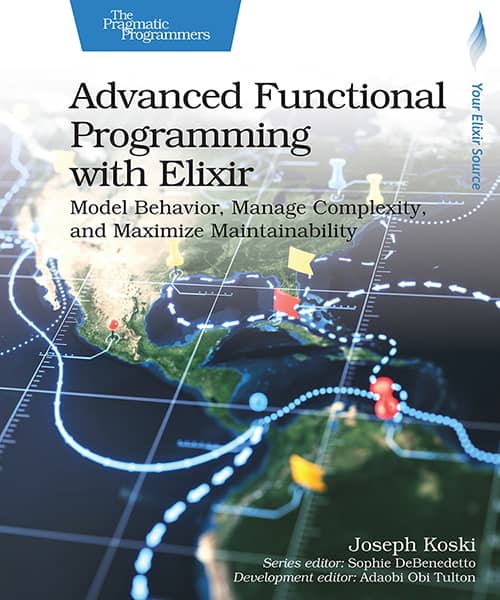Joseph Koski @JKWA
Series editor: Sophie DeBenedetto @SophieDeBenedetto
Developmental editor Adaobi Obi Tulton @aotulton
Combine advanced functional programming concepts with production-ready Elixir and proven domain-driven design techniques to write cleaner, more thoughtful software. You’ll explore foundational ideas like equality, ordering, predicates, monoids, and monads—then go beyond syntax as you develop intuition for composing logic, modeling behavior, and growing systems. With a focus on maintainable, declarative code over theory, you’ll gain practical, composable patterns you can apply right away.
Get ready to manage crowds, adjust priorities, and keep everyone safe in FunPark, a place that never sits still. Your job is to model that complexity and build the systems that keep everything running smoothly, even as the business team is still figuring out what they want and the experts keep rewriting the rules.
Using core abstractions—equality, ordering, predicates, monoids, and monads—you’ll break problems into small, composable pieces that are both well-behaved and easy to combine. Rather than getting bogged down in theory or formal proofs, you’ll dive into real-world Elixir—using protocols, structs, and pattern matching to express shared behavior across your domain. Along the way, you’ll build the vocabulary and mental models you need to organize complex logic, supported by a production-ready open-source library you can use, extend, and explore in your own projects.
Whether you’re an Elixir developer mastering functional programming or a functional programmer exploring Elixir, you’ll discover how to write code that’s easier to reason about—and create systems that stay understandable, even as they grow.
Joseph Koski is a software engineer with expertise in functional programming, domain-driven design, and safety-critical systems. He created the Funx library, bringing tools like monads to Elixir. He writes at joekoski.com, sharing insights on functional programming, real-time systems, and using Elixir to solve complex, reliability-focused problems.
- Full details: Advanced Functional Programming with Elixir: Model Behavior, Manage Complexity, and Maximize Maintainability by Joseph Koski
- View this book’s portal and details on how to post errata and suggestions here.
Don’t forget you can get 35% off with your Devtalk discount! Just use the coupon code “devtalk.com" at checkout ![]()

